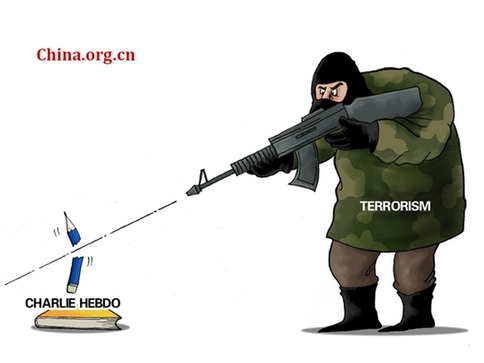Islamic terrorism strikes Europe
- By Tim Collard
 0 Comment(s)
0 Comment(s) Print
Print E-mail China.org.cn, January 12, 2015
E-mail China.org.cn, January 12, 2015
|
|
|
Charlie Hebdo attack [By Zhai Haijun/China.org.cn] |
It will not have escaped the notice of the Chinese public that Europe has been struck by tragedy in the last few days. A well-armed, well-trained and well-organized group of terrorists broke into the offices of a Paris newspaper on Jan. 7 and deliberately killed ten staff and two police officers. They claimed that this was revenge for the newspapers publishing cartoons featuring the Muslim prophet Mohammed. The gunmen then went on the run, took more hostages and were finally cornered and killed by the police two days later, in a very efficient operation which freed the hostages. It is good that it is over, but a whole continent remains traumatized. How could this happen?
This is becoming a worldwide problem, as the number of violent extremists claiming to act on behalf of Islam is growing. It might be thought that the emergence of such a situation is an example of the West's weakness in dealing with violent dissent by minority groups. Certainly it is difficult to imagine this course of events occurring in China, although there have been one or two serious incidents in Beijing and Kunming. But this view needs to be differentiated. Terrorists claiming an Islamic motivation have been active in Britain, France and Germany, as well as perpetrating an appalling massacre in Spain in 2004: but, on the whole, the United States has fared better after the horrors of 9/11.
This might sound surprising; the United States is an extremely diverse country with a large Muslim population, it is the country most blamed by Muslims for waging wars in the Middle East, and it is far easier to obtain weapons there than in European countries. So how does the United States generally avoid the problem of extremist Muslim violence?
Paradoxically, it is probably due to the American culture of freedom of speech. It is perfectly possible to preach the most extreme forms of Islam; by the American constitution the government has no right to interfere. But, for that reason, the community tends to police itself. American communities simply will not accept co-existence with groups wholly inimical to the United States and everything it stands for, especially while soldiers are fighting overseas.
But in Britain and France the problem is a different one, and one linked to the colonial past of both countries. Because both the British and French empires contained large Muslim populations, in the post-imperial era many former inhabitants of the colonies have established sufficiently strong links to the "mother" country to have obtained residence, and often citizenship, there. But, largely because of post-imperial resentments, many former colonials have not integrated as well into British and French society and its customs and values as immigrants to America normally do.






